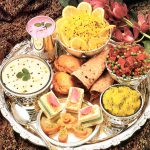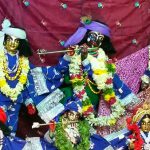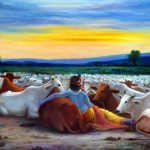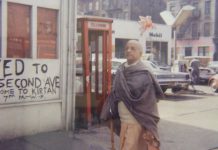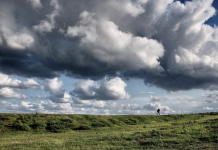by Patita Pavana das Adhikary
In his Bhaktivedanta Purport to verse 2.57 of the Shrimad Bhagavatam’s seventh canto, Shrila Prabhupada writes:
“Yamaraja once asked Maharaja Yudhisthira, ‘What is the most wonderful thing within this world?’ Mahārāja Yudhisthira replied (Mahabharata, Vana-parva 313.116):
ahany ahani bhutani gacchantiha yamalayam
sheshaḥ sthavaram icchanti kim ashcaryam atah param
“Hundreds and thousands of living entities meet death at every moment, but a foolish living being nonetheless thinks himself deathless and does not prepare for death. This is the most wonderful thing in this world.”
“Everyone has to die because everyone is fully under the control of material nature, yet everyone thinks that he is independent, that whatever he likes he can do, that he will never meet death but live forever, and so on. So-called scientists are making various plans by which living entities in the future can live forever, but while they are thus pursuing such scientific knowledge, Yamaraja, in due course of time, will take them away from their business of so-called research.”
The Vedabase carries a decent English version of the Mahabharata by ISKCON devotee Shri Krishna Dharma Das of England that is well-written and immensely readable. The story of Yudhisthira’s conversation depicted above by Shrila Prabhupada is neatly-condensed in the chapter entitled “The Lake of Death.”
The episode begins when a brahmana appeals to the Pandavas to find his arani sticks (used in fire sacrifices) that a deer has run off with. We pick up the narrative after the other Pandavas in turns have failed to return from fetching water while on their search for the sticks. Now King Yudhisthira, who is Dharmaraja-putra himself, must find not only the sticks, but his four missing brothers…
“Passing by trees covered in blue and red blossoms, Yudhisthira approached the lake. The warbling of birds and the hum of bees resounded in his ears as he moved quickly through the woods. Within a short time he came to the lake, which seemed to him as if it had been transported from Indra’s abode. It was covered with lotuses and surrounded by blossoming trees and varieties of wild forest flowers. By the side of the delightful lake, however, Yudhisthira saw his four brothers fallen to earth, resembling the four Lokapalas fallen from the heavens at the end of an age.
“Yudhisthira ran to his brothers and fell to the ground by their side. Breathing heavily he shed tears of grief. He lamented loudly, his voice echoing from the tall trees around the lake. ‘O mighty-armed Bhima, you swore you would break Duryodhana’s thighs in battle. Of what value is that promise now? O Arjuna, how are you lying here today? Human promises may prove false, but how can those of the demi-gods? We heard all the celestials proclaim your glories and declare that you would win back our lost kingdom. “None will be able to vanquish him in battle,” was Indra’s prophesy. How has this come to pass? Surely my heart is made of stone because it does not shatter upon seeing such a sight.’
“As he looked at his motionless brothers Yudhisthira was beside himself with grief. He cried for some time, his mind utterly confused. Gradually, he managed to control himself and ponder the situation. Who could have slain these great warriors? There were no signs of battle––their bodies were unmarked––and they seemed to have dropped to the earth in some deep, dreamless sleep.
“Yudhisthira looked carefully at the lake. Perhaps Duryodhana had made it and filled it with poison. But no poison could kill Bhima. Maybe the Kauravas had conspired with the Asuras to bring about the Pandavas’ death. But again, what Asura could face Arjuna, who had single-handedly overpowered the Nivata Kavachas?
“Yudhisthira looked around. He could see no footprints. Arjuna’s arrows were scattered here and there, but there was no blood. It was unimaginable that Arjuna would not have hit his enemy. He never discharged his arrows uselessly. Yudhisthira considered that some mighty being without a material body must have overpowered his brothers. He examined them closely. Although they appeared dead, they had not lost their color and their features were unchanged. Their souls were surely still present, although the symptoms of life were gone. It seemed that their life-force had been removed by the demi-god of death himself, acting from within them. Convinced of this, Yudhisthira thought he would discover the truth if he entered the lake. It was because of this lake that his brothers had met their death.
“Yudhisthira went down to the water and, throwing off his armor, plunged in. Immediately he heard the same voice that had spoken to his brothers: “O child, do not take this water. This lake belongs to me and if you want to drink, you must first answer my questions.”
“Yudhisthira gazed around. ‘Who are you?’ he shouted.
“’I am a crane living on moss and fish. Your younger brothers, disregarding my warning, have been brought by me under the control of death. O King, if you do not answer my questions, then you shall become the fifth victim.’
“Yudhisthira looked about in astonishment. He saw the crane on a tree bough near the lake. ‘Are you Shiva or the foremost of the Vasus? Or are you a Marut? It is not possible for a bird to have killed these four mountain-like heroes. O strongest of all those endowed with strength, you have achieved what even the gods, Gandharvas and Asuras could not do. I do not know who you are or what is your intention, but I am curious to know these things––and I am also terrified. My heart is troubled and my mind confused. Please tell me why you stay here and what you desire.’
Yudhisthira then saw the crane transform into a huge, fearful-looking being. His large red eyes were pointed and he blazed like the sun. Roaring like a thundercloud, he said, ‘I am a Yaksha, not a bird. Hail to you! It was I who killed your energetic brothers for their own faults. Although forbidden to drink, they disregarded me. If one loves life, he should not attempt to take this water by force. The lake is mine and one may take its water only after answering my questions.’
“‘O Yaksha, I do not wish to take what is yours. I shall try to answer your questions to the best of my ability. Please ask me what you will.’
“The Yaksha began to place questions before Yudhisthira:
“‘What makes the soul rise out of his entanglement in matter? Who keeps him company, who is his guide on that spiritual journey, and on what is he established?’
“’It is knowledge of the Supreme Lord which makes the soul rise. Godly qualities are his companions, dharma is his guide, and he is established on truth.’
“’What makes one learned? How does one attain to that which is most exalted? How does one acquire a second self, and by what, O King, does one become wise?’
“‘One becomes learned by studying the Vedas. By asceticism one attains what is most exalted. Intelligence is like a second self, and serving one’s elders makes one wise.’
“The Yaksha then asked about all kinds of subjects, ranging from worldly wisdom to knowledge of religion to spiritual matters. Yudhisthira answered them all without hesitation. Finally the Yaksha said, ‘I am satisfied. Answer my last four questions and I will restore one of your brothers to life.
“‘Who in this world is happy? What is the most wonderful thing? What are the tidings of this world, and how can one find the eternal path of religion?’
“With folded palms Yudhisthira replied, ‘He who is neither in debt nor exiled and who lives simply, eating simple food in his own home, is happy. The most wonderful thing is that although every day innumerable creatures go to the abode of death, still a man thinks he is immortal. The tidings are that in this world––which is like a cauldron with the sun as its fire, days and nights as its fuel, and months and seasons as its wooden ladle––all creatures are being cooked by time. The eternal religious path is found only in the heart of great mystics.’
“The Yaksha smiled. ‘You have rightly answered every question. Tell me which of your brothers you wish to have restored to life?’
‘O Yaksha, let Nakula, as tall as a sal tree and endowed with a broad chest and long arms, be brought to life.’
“The Yaksha was surprised. ‘Bhimasena is surely more important to you than Nakula, O King, and Arjuna is your chief support. Why do you ask for Nakula to be revived?’
“‘He who sacrifices virtue is himself destroyed,’ replied Yudhisthira, “and he who preserves virtue is in turn preserved by it. I am therefore careful to always observe virtue. For me, great virtue lies in refraining from cruelty; it is superior to all worldly gain. Thus I ask for Nakula. Both Kunti and Madri are the same to me. In myself Kunti still has one son, but Madri now has none. With a desire to behave equally toward my two mothers, I ask for the life of Nakula.’
“‘Since, O Pandava, you consider abstention from cruelty superior to both profit and desire, then let all your brothers be restored to life.’ As the Yaksha spoke, the four brothers rose from the ground as if from a sleep. They felt refreshed and free from hunger and thirst.
“Yudhisthira then asked the Yaksha, ‘Who are you, O great being, who assumes the form of a crane? Tell me in truth your identity. Are you a demi-god? Perhaps you are my father himself.’
“Yudhisthira had guessed correctly and the Yaksha replied, ‘I am indeed your father, O best of the Bharatas. Know me to be Dharmaraa. I have come here with the intention of meeting you. Fame, truth, self-control, purity, simplicity, charity, modesty, steadiness, asceticism and celibacy are my limbs. I am reached by abstention from cruelty, impartiality, peacefulness, asceticism, purity and humility. You possess all these qualities, dear son. By good fortune you have conquered your mind and senses and practice virtue. I wanted to test you and I am fully satisfied. Ask me for boons and I will bestow them. Those who are ever devoted to me need never experience misfortune.’
“Yudhisthira bowed respectfully before his father and said, ‘My first desire is that the Agnihotra of the brahmana whose fire-sticks were lost not be destroyed.’
“‘O son of Kunti, it was I in the form of the deer who carried away those sticks. I shall return them to you. Ask for some other boon.’
“Yudhisthira thought carefully and said, ‘The twelve years of our forest life are now complete. For the thirteenth year we must live incognito. Please grant that no man will recognize us during that time.’
“‘So be it. Tatasthu. Even if you wander about in the world as your actual selves, you will not be recognized. Through my favor you will lead a secret, incognito life in the city of Virata. Now take these fire sticks and ask from me another boon. I am not satisfied with conferring only these two favors. O Yudhisthira, you should know that I begot you. Vidura, your friend and well-wisher, is also a part of myself.’
“Dharma handed the sticks to Yudhisthira, who replied, ‘O greatest among the demi-gods, it is enough for me that I have seen you. To please you, however, I will accept one further boon. O lord, grant that I may always overcome avarice, folly and anger, and that my mind be always inclined toward charity, asceticism and truth.’”
“Dharma smiled and said, ‘By nature you are gifted with these qualities, O Pandava. You are already the embodiment of virtue. But I grant your desire.’
“The demi-god then disappeared, leaving the five Pandavas standing together on the shore of the lake. In wonder they returned to their hermitage with the brahmana’s fire-sticks.”
Selfless King Yudhisthira’s devotion to duty above personal desires remains unsurpassed in the history of the world. Even Draupadi, the wife of the five Pandavas who appeared from King Drupada’s fire yagna (and is therefore of divine origin), was tested to the limits by his unerring adherence to the kshatriya code of ethics.
So much so, that she would at one point ask of Bhima, “How can she who has Yudhisthira for a husband ever be free from grief?”



